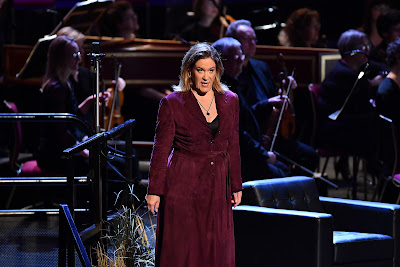 |
| Robin Ticciati and the OAE - Mozart: La Clemenza di Tito - Glyndebourne Opera at the BBC Proms (Photo BBC / Chris Christodoulou) |
Reviewed by Robert Hugill on Aug 28 2017 Star rating:
Strong musical values, and intense performances in this semi-staging at the Proms
 |
| Anna Stephany (Photo BBC / Chris Christodoulou) |
With the orchestra pushed well back on the platform, the opera was performed in two areas, the fore-stage and a raised area behind the orchestra. Rutherford’s blocking made very effective use o the Royal Albert Hall. The remains of Schmidt’s sets, modern arm-chairs, clumps of corn and rather plastic-looking rocks, puzzled somewhat. The costumes were stylish modern dress, though somewhat drab in colour except for that of the actor playing Berenice, Tito’s lost love.
This was very much a modern-day production with contemporary mores, there was little of the classical nobility often associated with the work. Richard Croft’s Tito was wracked throughout with extreme emotion and his clemency was hard won, with some violence done to the musical line of the recitative (granted, this is not by Mozart but he must have approved of it). Similarly Vitellia and Sesto’s relationship was very physical, we first encountered Alice Coote and Anna Stephany in a very compromising clinch.
Anna Stephany made a very lithe, youthful Sesto, convincing in masculinity and very much suggesting Sesto’s youth, and the gap in ages between him and Alice Coote’s maturer Vitellia. Stephany’s performance was similarly lithe, her slim mezzo-soprano voice offering us a combination of shapely line and vibrant passion. ‘Parto; ma tu ben mio’ was taken quite slowly in the opening section with great freedom in the phrasing, but Stephany and the clarinettist really conveyed the music’s intensity whilst Sesto’s final aria, the rondo ‘Deh, per questo istante solo’ was beautifully shaped, rising to strong emotion at the end.
Vitellia is a role that Alice Coote seems to have been born to play, a complex character whom we don’t quite love but can understand.
Coote really brought out Vitellia’s conflict of emotions, and in each utterance we could see and hear the play of emotions across her face and her voice. Some of the role lies quite high for a mezzo-soprano, but Coote never made us feel she was going outside the role the extremes of range (high and low) were representative of the extremes of emotion. But there was also much quiet, beautiful singing; this Vitellia was more than just a scheming bitch. Coote crowned the performance with a stunning final accompanied recitative, where each word was strongly coloured, leading to a tormented account of ‘Non, piu di fiori’. This had Coote’s trademark flexibility of phrasing and use of rubato, but always in the service of heightening the emotion. And she was superbly partnered by the solo basset-horn. Interestingly I had previously seen Coote as Sesto, and wondered how many mezzo-sopranos have played both roles.
 |
| Alice Coote (Photo BBC / Chris Christodoulou) |
The only soprano in the cast, Joelle Harvey was a demure but strong-minded Servilia. Harvey showed that pure tone and beautiful phrasing could be combined with real strength of character. Servilia is one of the few admirable characters in the opera, and Harvey made it show. She was finely partnered by Michele Losier’s Annio. Like Anna Stephany, Losier created Annio as a believable, rather intense and serious young man. And made him count as a character, rather than just a dry run for Sesto. Michele Losier and Joelle Harvey made Annio and Servilia’s Act One duet profoundly touching.
Tito’s arias are some of the most conventional in the opera. Richard Croft was not unstylish, but his singing was very vibrant with a great sense of drama rather than classical poise. It was very much in those recitatives that he really made the character felt. Clive Bayley was a highly characterful and easily dislikeable Publio, definitely a career politician on the make. And Bayley sang Publio’s aria with vivid vigour.
One of the striking features of librettist Caterino Mazzola’s adaptation of Metastasio’s libretto (done to Mozart’s instruction), is the introduction of many duets, trios and ensembles. And Mozart’s use of them make the drama really progress. It was noticeable in this performance ow the cast used the ensembles dramatically. So that both trios told a real story, and the astonishing ensemble which concludes Act One was positively gripping.
The Glyndebourne Festival Chorus was on strong form, singing Mozart’s choruses with power and style. But, in the context of a stripped back staging their use of Peter Sellers-like hand choreography was somewhat puzzling.
Robin Ticciati conducted a lithe and lively account of the score, but he was not averse to slowing down and allowing highly expressive phrasing from the singers. The Orchestra of the Age of Enlightenment was on strong form, producing a nice mix of drama and sophistication.
Mozart’s penultimate opera can still sometimes seem something of a misunderstood ugly duckling, its reversion to opera seria an aberration after the trio of operas with Lorenzo da Ponte. The opera’s message of clemency is very much an Enlightenment concept which does not always sit well with modern directors. But Glyndebourne fielded a well balance cast, and all contributed to a performance which, musically at least, took the opera seriously and conveyed intense emotions with great style.
This review also appears in OperaToday.com



.jpg)






%20Craig%20Fuller.jpg)
No comments:
Post a Comment